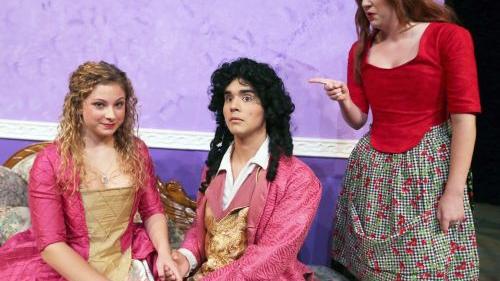After a series of fairly long novels prior to the medium-length Beau Geste, there is now an interlude of four plays, which break down into a couple of pairs in which each set of two could be said to be related in terms of time and place. Farquhar is a name that, through whatever fortunate cause, has survived to some extent even down to our day. The Beaux' Stratagem as literature I would consider on its own an entertaining, but not a great play, though having read at least a dozen plays over the years from this family of literature (Restoration and 18th century English theater) the importance and centrality of this genre in the history of English literature has been strongly impressed on me. And of course as with all plays, seeing a good performance would doubtless enhance the experience of having read the book considerably.
The IWE intro reports that "This was the last play Farquhar wrote; he was sick and in the utmost poverty when he wrote it--for money to pay his creditors--and he died on the night of its third performance." He was around 30 years old at the time of his death. In the 1933 Introduction to the Modern Library edition of Twelve Famous Plays of Restoration and Eighteenth Century--a very useful book to own, as I have had occasion to read nine of the twelve plays in it for the "A" list over the years and at least seven of the entries come up on the IWE list as well--Professor Cecil A. Moore of the University of Minnesota sees Farquhar as a transitional figure between the wits of the Restoration and the broader, more whimsical humor of the 18th century. His final two plays, says the professor, this one and The Recruiting Officer, performed first in 1706, "reveal dramatic genius of a high order." He adds that in Farquhar, "the Muse has now deserted the drawing-room for the country, and that many charmingly fresh types of character have been brought in to replace the endless parade of fops and coquettes." The setting of the play in a provincial inn (in Lichfield) frequented by travelers and coaches and highwaymen does hearken back to Shakespeare a little in bringing the English Midlands back on the stage, though the glories of the countryside and its floral life are absent from Farquhar.
I only took 4 notes on this. I should have written more commentary about my feelings and thoughts as I read it. Perhaps I didn't have any, but that isn't really fair, because the play has a certain charm about it, in part due to its, at this point, real remoteness in time, though the era of Queen Anne was a lively one in English literature, full of vigorous and proud characters, for which I have a more than usual fondness because I think this very interesting period tends to be overlooked now even by people who like Shakespeare or the Romantics or the Victorians.
Act III, Scene III, sample of play's humor:
"Sullen: You're impertinent. Mrs. Sullen: I was ever so, since I became one Flesh with you. Sullen: One Flesh! rather two Carcasses join'd unnaturally together."
Act IV, Scene I The servant Scrub to an impertinent French priest:
"Sir, I won't be sav'd your way--I hate a Priest, I abhor the French, and I defie the Devil--Sir, I'm a bold Briton, and will spill the last drop of my Blood to keep out Popery and Slavery."
In the same scene, Archer critiquing a portrait of the attractive Mrs. Sullen:
"Your Breasts too, presumptuous Man! what! paint Heaven! Apropo, Madam, in the very next picture is Salmoneus, that was struck dead with Lightning, for offering to imitate Jove's Thunder; I hope you serv'd the Painter so, Madam?"
Part of the resolution of the plot comes when the well-born but somewhat broke Aimwell's older brother, who is a Lord, dies unexpectedly, and the surviving sibling inherits the fortune. While undoubtedly a stroke of good luck for the character, his rather unabashed delight at it comes off as rather strange, given that there was no indication of the dead brother's having been a villain or otherwise bad guy that I can recall.
Here is a link to an old and unfinished post in which I recall a night I spent in the George Hotel in Lichfield which claims to be the same where The Beaux' Stratagem took place, and tell a Farquhar story.
The Challenge
1. Marcus Zusak--The Book Thief.......................................................................................17,971
2. Dean Koontz--Forever Odd.................................................................................................949
3. The Complete Rhyming Dictionary (ed. Clement Wood)....................................................204
4. Sarah Smarsh--Heartland.....................................................................................................109
5. Shana Norris--The Boyfriend Thief........................................................................................86
6. Real Housewives of New York (season 10--TV show)...........................................................58
7. Daniel Henderson--The Prayer God Loves to Answer...........................................................37
8. Anthony Trollope--Rachel Ray..............................................................................................19
9. Caitlin Kiernan/Kathleen Tierney--Cherry Bomb..................................................................15
10. Dan Hall--Highgate Mums: Overheard Wisdom From the Ladies Who Brunch.................12
11. Laxdaela Saga (trans. Press)..................................................................................................6
12. Dawn French--Me. You. A Diary...........................................................................................6
13. Andrew Sanders--The Short Oxford History of English Literature.......................................4
14. William Harrison Ainsworth--Jack Sheppard.......................................................................3
15. Rev. E. Cobham Brewer--Character Sketches of Romance, Fiction & the Drama, Vol. 1...1
16. The Greek Romances of Helodorus, Longes & Achilles Tatius.............................................0
17. Mary Elizabeth Braddon--Willard's Weird............................................................................0
18. Rev. E. Cobham Brewer--Character Sketches of Romance, Fiction & the Drama, Vol. II...0
19. George Brandes--William Shakespeare: A Critical Study......................................................0
Qualifying Round
#14 Ainsworth over #19 Brandes
I have actually read what is regarded as Ainsworth's best novel, The Tower of London. I don't remember much of it now, but I know I found it readable and even amusing in places at the time.
#15 Brewer over #18 Brewer
This was a tight match, as you can imagine.
#16 Greek Romances over #17 Braddon
I can't find any corroborating evidence that the Braddon book actually exists.
Round of 16
#1 Zusak over #16 Greek Romances
The Greek book is both rare and the three authors make it seem cumbersome. Zusak's qualifying score is one of the highest ever in the history of the Challenge. I even have a copy of this book at my house because my one of my children had to read it in school instead of David Copperfield or whatever early high schoolers used to read. I thought it deserved to escape the 1st round.
#15 Brewer over #2 Koontz
I want no part of Dean Koontz.
#3 Rhyming Dictionary over #14 Ainsworth
Huge score for this dictionary, impressive.
#13 Sanders over #4 Smarsh
#5 Norris over #12 French
#11 Laxdaela over #6 RHONY
#10 Hall over #7 Henderson
#8 Trollope over #9 Kiernan/Tierney
Trollope, whom we have seen so recently, the only IWE author in the field this time.
Elite Eight
#15 Brewer over #1 Zusak
Brewer sitting there with that upset to drop.
#3 Rhyming Dictionary over #13 Sanders
A scrap, but I was swayed by the huge disparity in the qualifying scores.
#5 Norris over #11 Laxdaela
A minor upset.
#10 Hall over #8 Trollope
Trollope a victim of the upset here.
Final Four
#3 Rhyming Dictionary over #15 Brewer
#5 Norris over #10 Hall
Another battle, but Norris escapes again.
Championship
#3 Rhyming Dictionary over #5 Norris
I have no idea whether I will actually try reading this book or not, but I will at least look at it.





No comments:
Post a Comment